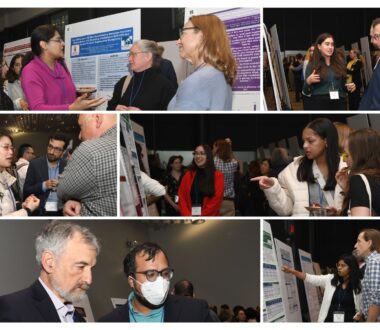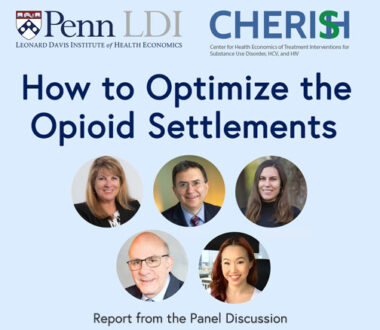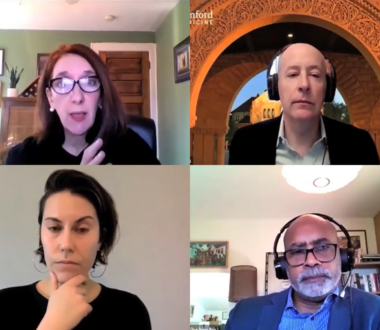
Back in Person and Taking a Bite of the Big Apple
Over the course of three days, from October 18-20, 2023, the annual Addiction Health Services Research (AHSR) Conference brought over 300 attendees to Roosevelt Island in New York City to share new addiction research findings, learn about the field through pre-conference workshops, develop collaborative relationships, and support early-career and under-represented investigators. “I am so proud […]

Sharing Your Research for Maximum Impact
In today’s digital and media landscape, there are several ways to disseminate your health economics research after its publication. From our experience, writing social media, news posts, and policy briefs has allowed us to convey study findings from different angles, reach new audiences, and inform key decision makers. As you are preparing your next journal […]

Stigma and Sluggish Bureaucracy Block Treatment for Stimulant Use Disorder
So, imagine there’s a runaway epidemic of overdose deaths that involve non-opioid drugs and that we’ve had an evidence-based therapy for this unique addiction for the last forty years—but for reasons largely grounded in legislators’ and the public’s visceral disdain for people who use substances, we have refused to nationally recognize or widely implement this […]

Incentivizing Recovery: Payment, Policy, and Implementation of Contingency Management
On January 19th, 2024, CHERISH and the University of Pennsylvania’s Leonard Davis Institute of Health Economics (LDI), co-hosted a virtual convening titled Incentivizing Recovery: Payment, Policy, and Implementation of Contingency Management. Contingency management is a proven and promising treatment for specific substance use disorders, especially stimulant use disorder. However, significant gaps in knowledge regarding the […]

Penn LDI & CHERISH Launch New Online Communications Training Course for Academic Researchers
The University of Pennsylvania’s Leonard Davis Institute of Health Economics (LDI), which since 2019 has been offering the Amplify[at] LDI in-person communications course to help academic researchers translate and disseminate their findings more widely, has developed and just launched a free, online course providing an introduction to the same topics. The new training resource is […]

Will States and Counties Spend Their National Opioid Settlements Effectively?
As $54 billion in National Opioid Settlement funds begin moving out toward states, counties, and municipalities, there is widespread concern among health authorities that the legal victory does not become a repeat of the 1998 mega-billion-dollar Tobacco Master Settlement Agreement fiasco in which most states used the money for just about everything except tobacco cessation […]

Engaging with People with Lived Experiences in OUD Modeling Research
Drug overdose deaths continue to rise in the United States and Canada, with the risks for greater opioid use sharply increasing in Mexico. As modelers, we know simulation modeling is a valuable tool that can inform policies and interventions to prevent overdose deaths and reduce related harms including drug overdose, HIV, and hepatitis C virus […]

Why Does the Opioid Mortality Rate Continue to Rise?
From April 2020 through April 2021, there were 100,300 drug overdose deaths across the country according to the CDC — a 28.5% increase over the previous year. Some 75% of these were opioid-related overdoses that killed an average of nine users an hour around the clock throughout the year. Looking forward, the just-published Stanford-Lancet Commission on […]

Advancing Evidence-Based Substance Use Disorder Treatment Policies
If you want to reform state laws to require detox facilities to include medications like buprenorphine and methadone in their treatments, you should start by changing the “hearts and minds” of those who oppose it, Rebekah Gee, MD, MPH, MHSPR, told the January 14, 2022 Penn LDI/CHERISH Virtual Conference at the University of Pennsylvania. Keynoting a gathering organized […]

Principles and Metrics for Evaluating Oregon’s Drug Decriminalization Measure
In November 2020, Oregonians voted to pass Measure 110, a ballot initiative that decriminalizes the possession of small amounts of all drugs and increases access to low-barrier substance use disorder treatment and harm reduction services. Led by the Drug Policy Alliance, the ballot measure is a historic step forward to address drug-related arrests that disproportionally impact low-income and people of […]

Improving Opioid Overdose
In the summer of 2021, the National Institute on Drug Abuse (NIDA) awarded Bruce R. Schackman, CHERISH director and Saul P. Steinberg Distinguished Professor at Weill Cornell Medicine, and Natasha Martin, CHERISH Research Affiliate and associate professor in the Department of Medicine at the University of California San Diego, a scientific conference grant to provide simulation modeling […]

CHERISH Awarded Five-year Center of Excellence Grant to Continue Substance Use Health Economics Research
The National Institute on Drug Abuse (NIDA) of the National Institutes of Health has awarded the Center for Health Economics of Treatment Interventions for Substance Use, HCV and HIV (CHERISH) a five-year grant to continue the Center’s activities as a national center of excellence. CHERISH was founded in 2015 as a multi-institutional center for health […]
Engage with CHERISH
Submit a Consultation Request or Contact Us to learn more about how CHERISH can support your research or policy goals.